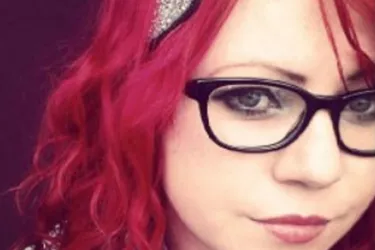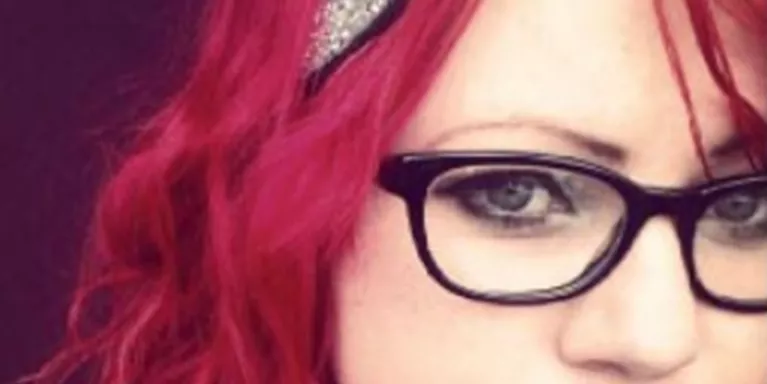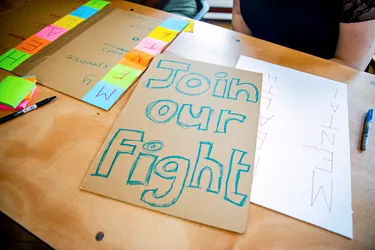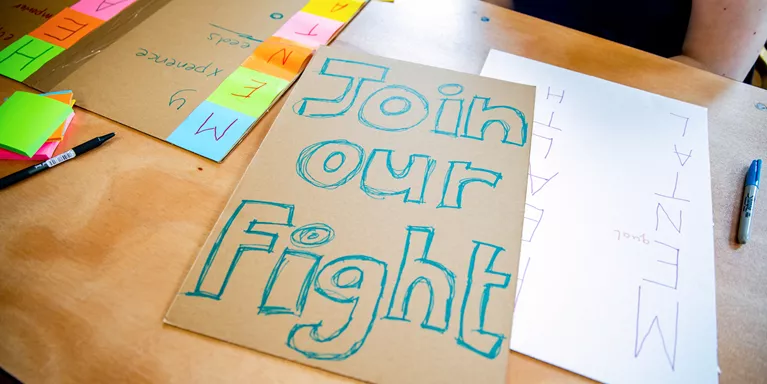My body comes with a trigger warning
Seaneen blogs about living with the scars of self-harm. She is a mental health writer and digital community officer for Mind. Her blog is called "The Secret Life of a Manic Depressive".
I turned 30 in September. And from the ages of 12 until 24, I self harmed, and I did it a lot.
There were lots of reasons. I was struggling. I was alone. I was a girl and expected never to be angry so this was the only way I knew how to let it out.
"I didn't know how else to cope. I didn't like myself."
Not everyone who self harms stops, not everyone who self harms regrets it, but I do. I regret it more than anything else I've ever done in my life. Had I, at the age of 12, understood what permanence was, I'd have never started. Because permanence is the word.
"I am scarred for life. You don't really understand things like that when you're 12."
And it's not very fair that twelve year olds self harm. But I did, and there it is.
"Stigma" has two meanings. One is religious- they're the literal marks on the hands of Christ at the crucifixion, and then bestowed upon those whom were holiest- and by extension, those who suffered the most. The other is social- a mark of disgrace. Self harm is both. It is highly stigmatised in society and within the health system, and it is a mark of suffering.
Suffering only has cache if it's quiet, or, "dignified". If you make people uncomfortable with your suffering, then there's stigma. And therein lies the rub.
"How do you combat stigma on something that makes other people uncomfortable?"
How do you say people who self harm should be treated with kindness when their bodies are seen as attacks on others, to say that self harm shouldn't be a problem hidden in the dark, when we do exactly that by not allowing representations of self harm?
"I just have scars now. They're very noticeable but also very faded."
Recently, I had a baby. In the postnatal ward, a midwife wrote that I was sitting on the bed holding my baby, "scars on arms". That's six year old self harm scars, as relevant to my medical history as a broken leg, and yet so very present, because they were, on a hot stuffy ward, visible. That's what I was reduced to- "scars on arms", the loving arms holding my newborn son, the arms of a new mother, a person, exhausted, elated, and ordinary.
There are hugely conflicted messages around self harm. One is, "be proud" and that self harm needs to be more visible to become normalised (whether it should be normalised is up for debate). But if you have self harmed on a part of your body that can be covered up, being visible is often a choice and it comes at a personal cost.
"On a postnatal ward straight after having a baby, the last thing I wanted to do was put on a cardigan and be boiling hot."
But when they do, they judge me accordingly. As a risk to my child (which was clearly the implication in my notes), as an "attention seeker" (a refrain familiar to most people who have self harmed), a multitude of uninvited sympathetic comments and confessions, and equally uninvited abuse when I am just existing in the world with the body I wear, and perhaps worst, as violent (though people who self harm are internalising violence rather than externalising it).
There are conflicted messages too from within the world of mental health. Publishing images of self harm is generally discouraged as being triggering. I understand this, as I find lurid images of self harm triggering, too. When it comes to scars, though, that's trickier. Scars could be construed as positive images of recovery, although my experience has been that no matter how long it's been since I've self harmed, I'm still perceived as a, "self harmer" (awful words). But they can still be triggering, and they still make people uncomfortable. And if you're wearing your sleeves up because you're warm, or itchy or uncomfortable, or just because, you may be seen as making a statement, when you're not, it's just your body. Even when it's written about, judgemental language abounds (did you spot "lurid" there?)
"So what to do when your whole body comes with a trigger warning?"
It's personally invalidating. It's hard to be proud of yourself or feel okay about something that is censored- even if the reasons for censoring are good ones. It's very hard not to internalise the feeling that your body is something that shouldn't be seen, that it's shameful, because your body makes other people feel uncomfortable, or hurt, or want to hurt themselves.
Winter is coming. I look forward to it, the season of sleeves, where I don't have to think about this stuff. I wish it were all year round.
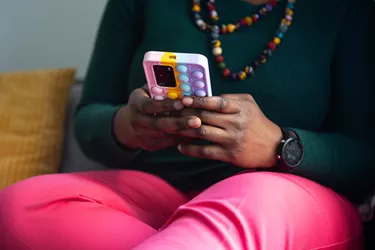

Information and support
When you’re living with a mental health problem, or supporting someone who is, having access to the right information - about a condition, treatment options, or practical issues - is vital. Visit our information pages to find out more.
Share your story with others
Blogs and stories can show that people with mental health problems are cared about, understood and listened to. We can use it to challenge the status quo and change attitudes.










